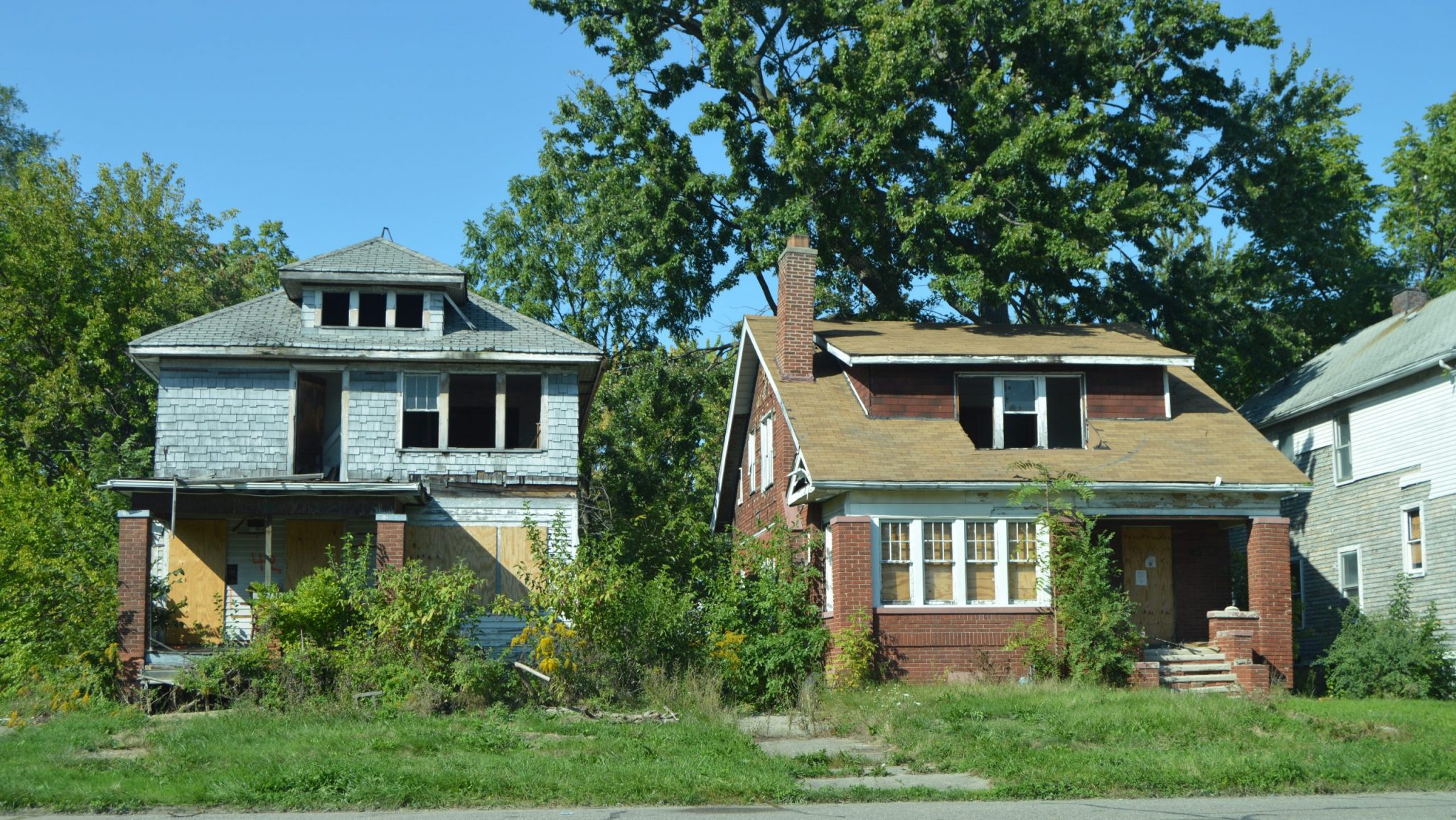Foreclosure Moratorium Not the End of Detroit’s Housing Crisis
Wayne County is suspending tax foreclosures, but as one housing advocate explains, some landlords will benefit at their tenants’ expense.

FILE — Blighted homes in Detroit.
With the onset of the COVID-19 outbreak, Wayne County suspended tax foreclosures and their subsequent housing auctions for the foreseeable future. More than 10,000 properties, including about 3,300 owner-occupied homes, were subject to foreclosure this year.
“The moratorium is good if you’re the owner, you get to keep what you have. It’s bad if you weren’t the owner.” – Michelle Oberholtzer, United Community Housing Coalition.
Michelle Oberholtzer, the director of tax foreclosure prevention for United Community Housing Coalition, usually tries to stop that process.
“The most benign cases in my opinion of when the foreclosure moratorium could be a bad thing are with vacant homes or vacant parcels of land that are just going to kind of rot and sit there for another year when they could be sold or made available in a different way,” Oberholtzer says. “And the more severe cases when the moratorium is harmful are occupied homes, where the ownership is either hostile or neglectful or somehow impeding progress that is needed.
As she tells WDET’s Eli Newman, that relief does not extend to most Detroiters. Most residents rent and will likely be paying their landlords through the pandemic. As she tells WDET’s Eli Newman, delaying foreclosures has some negative side effects.
Click on the player above to hear Michelle Oberholtzer discuss Wayne County’s foreclosure moratorium, and read the transcript, edited for length and clarity, below.
Eli Newman, 101.9 WDET: In a way, the tax foreclosure is, in essence, more harmful to somebody who rents in Detroit, or who’s on land contract in Detroit than somebody who actually owns their house outright.
Michelle Oberholtzer, United Housing Community Coalition: The moratorium is good if you’re the owner, you get to keep what you have. It’s bad if you weren’t the owner.
We see everything from the spectrum of an absentee landlord where there is no one to pay, there is no one to buy the house from. The house is falling apart. The person who lives there, they call it home, they would like to invest in it, but they need to know that they have rights to it. And then we have super predatory situations where there may be a scammy land contract or a landlord who is really doing everything but their responsibility. They’re just there to collect money and extract and they’re not reinvesting and they just bought another year of impunity. This is not really just a bailout for low-income homeowners. There were solutions for those people.
That kind of delay has an effect on programs that allow tenants’ first rights on purchasing a home. So can you explain how it affects them in that way?
Ever since last year, we’ve been meeting residents of homes that were facing foreclosure this year who are not the owner, and either there is a landlord or there isn’t, but they’d like to become the owner. And so we actually look forward to the foreclosure.
I tell a lot of people this is actually a blessing for you because it could give you an opportunity to own the house that you live in. And what happens is the tax foreclosure, when it happens, the Wayne County Treasurer becomes the owner. So it breaks the title from whoever owned it before, now it’s owned by the Wayne County Treasurer, and they then offer the home to the City of Detroit.
The city has a program in partnership with United Community Housing Coalition, where they’ll buy occupied homes who are qualified for this program where the resident can buy it. So our experience after the moratorium was in making rejection phone calls and sending letters to hundreds of people who would be hopeful that they could buy their home and now they cannot and, you know, there are a lot of really complex and difficult situations that are going to result.
Ultimately, what needs to be done to protect Detroit’s most vulnerable residents at this time and going forward?
One of the things that we need to do to protect Detroit’s most vulnerable residents is to make sure that there are ways that they can withhold rent if there are outright violations to rental code being made, unfit housing situations where someone is still extracting a profit when they are not holding up their end of the bargain.
So we have to continue to push for renters’ rights in that way. We need to get better data. Some of it is a capacity issue. We may need more staffing that is dedicated to these issues. But this is a government-run foreclosure. The government register of deeds the government assessor’s office, the government treasurer, these agencies need to be working together so that they know which houses are owned by whom and which ones are owner-occupied so they don’t have to revert to sweeping measures when nuance is required.
Trusted, accurate, up-to-date
WDET is here to keep you informed on essential information, news and resources related to COVID-19.
This is a stressful, insecure time for many. So it’s more important than ever for you, our listeners and readers, who are able to donate to keep supporting WDET’s mission. Please make a gift today.
